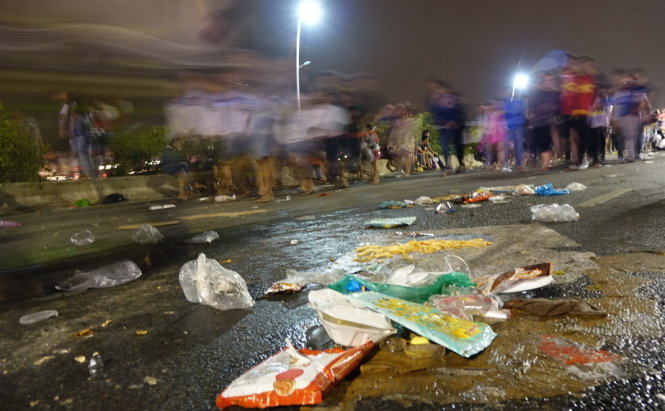The despicable habit of littering in public places by Vietnamese people is blamed on poverty in this society.
>> An audio version of the story is available here
Some argue that lack of education and self-respect are the main reasons. Others complain about the absence of laws and inappropriate legal enforcement.
Whatever the reasons, it is a common sight that people throw rubbish into waterways and on the road of pilgrimages to pagodas.
It is easy to witness well-dressed guests disposing of facial tissues and leftover food all over the floor in restaurants.
Not only do normal people litter, but better-educated people do as well.
In some instances, delegates invited to conferences on environmental protection were found littering right after leaving the events.
Famliy plays the main part
Many Vietnamese people sent varied opinions about this bad practice to an online forum hosted by Tuoi Tre (Youth) newspaper.
Mai Duc Dung said family plays the main role in forming the habits of children, including littering, but many families ignore the matter. He stressed starting with the family to eliminate this bad habit.
“Blaming it on the role of the community will not uproot the problem,” he wrote.
Families should talk about littering as a bad habit with their children during their meals at home and teachers can help during their lectures at schools, according to Dung.
“You can’t be a good example if your children see you take leaflets while stopping at a red light and then throw them on the street when the light turns green,” he worte on the forum.
A person is inclined to behave the way he/she saw from childhood.
Nguyen Khanh Toan wrote to Tuoi Tre that littering is not a small problem at all since it erodes the efforts of ‘the minority of different people’ who has managed to keep and restore ‘civilized behaviors’ in public places.
“I know many people behave well but they belong to the minority,” he wrote. “A swallow can’t bring spring.”
He even said that, “Those who are really disabled are the people unable to control their behavior.
“What are your opinions about a person who eats fast, walks slowly, and kisses only in private but pisses in public?
“I often saw many people do all the things.”
On corners of alleys and streets, one can sometimes see words scrawled on walls to insult violators, such as ‘Only Dogs Piss Here.’ This is clearly meant to hurt the self-respect of some people.
Loss of trust in community
A man who threw a bag of rubbish into the waterway of the Ben Nghe Canal in Ho Chi Minh City admitted to Tuoi Tre, “If I had not done it, others would have done it.”
Is that really the reason for his littering into the canal? Or is his lack of confidence to benefit from a clean canal, even though he tries to keep it clean, to blame?
Both of them should be seen as the reasons. And the man’s reply is not rare at all, as many have said it after being questioned on their trashing.
Those throwing garbage in public places are not only short of awareness of preserving the environment but they also have no confidence in others in their community.
This absence of trust results from what they usually see in daily life such as littering, graft, unfairness in crackdowns on rule violations.
That is to say, a traffic law breaker who has connections with police officers is often spared any penalty but others get fined.
One would see very often that a man takes out his mobile phone after being pulled over by traffic cops and acts as if he were calling someone in high positions before talking to the policemen.
Uncivilized behavior
A common scene at music shows and in stadiums is one of papers, snack bags, plastic bottles, and food boxes scattered all over the ground after the events.
Sometimes, people can be seen in expensive cars lowering their window and throw out a coconut or other rubbish while the cars are moving.
Not only do people litter, they even jostle and push, talk and laugh loudly, and insult others in public places.
“I saw young people attend a talk with Nick Vujicic, an Australian motivational speaker born without limbs, at Thong Nhat Stadium [in Ho Chi Minh City] last year.
“They joined the audience and during the entire talk they just played games on their iPads.
“Others behind me made impolite comments to insult the speaker they came to listen to and burst out into laughter,” the reader Toan wrote.
Wasting is another problem. Organizers of some events distribute soft drinks for free to all participants, many of whom only drink a part and throw away the rest.
The problem can be easily observed at buffet parties. After buying their tickets, guests begin loading food onto their dishes but eat just some of it and leave the leftovers before taking more food.
“I just want to say frankly that those behaviors are not nice and are certainly not to be proud of for themselves and for Vietnam at all,” Toan underlined.
Some responses on the Tuoi Tre forum tried to calm the nerves of ‘the minority of people’ in the community by saying, “Don’t worry, everyone will improve when Vietnam becomes richer.”
But it takes a lot of time to try to brainstorm the connection between the GDP of Vietnam and the problem of littering in public.
Problematic law enforcement
Vietnam has regulations to punish those who litter in public places, but in reality, few have ever been fined.
It seems that authorities pay more attention to wiping out other social evils than littering.
In developed nations like Singapore and in Europe, the awareness of people and effective legal enforcement grew together to establish clean nations.
Like us on Facebook or follow us on Twitter to get the latest news about Vietnam!




















































